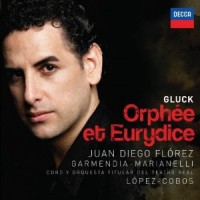Juan Diego Flórez is without question a superstar of bel canto repertory, but the recent release of the recording
of his role debut as Orphée in Gluck’s Orphée et Eurydice at the Teatro Real in Madrid raises some interesting questions. Among these questions, first and foremost is the nature of Orpheus, and whether Flórez has the vocal ability to portray a character as varied and dramatic as the musician of legend. While I can see a convincing argument for this being a great recording, there is something missing in Flórez’s interpretation to my ears that leaves the character incomplete and the drama unfortunately unfulfilled.
The roles which have made Mr. Flórez a star have some very integral things in common: the necessity of impeccable bel canto technique (which Mr. Flórez has in spades), an unnaturally high tessitura (also something Mr. Flórez has a great command of), and generally “cute” characters (the boyishly good looking tenor fits this archetype perfectly). What they lack, on the other hand, is something integral to the character of Orpheus: anger. There needs to be real fire, real anguish and pain for an Orpheus to succeed dramatically, which the beautifully sweet timbre of Mr. Flórez’s voice does not have.
There is no litmus test greater than the first lines of the opera for Orpheus, the anguished exclamations of Eurydice’s name during the opening chorus, “Ah! Dans ce bois tranquille et sombre.” If these don’t send shivers down your spine something is wrong, as is the case here. In Mr. Flórez’s singing you hear sadness, but the loss of his love sounds like a depressed melancholy and not a raging anguish that is strong enough to convince the gods themselves to allow him safe passage to the Underworld.
Similarly, Mr. Flórez’s “J’ai perdu mon Eurydice” is sweetly sad, and really very cute. He almost sounds like a high school boy who was dumped by his true love; which in another opera would be touching and very effective, but not here. As Orpheus, this singing is incomplete and unfulfilling. There is no hint of a loss so deep and unconquerable that the only recourse is suicide.
But really, it is beautifully sung. The qualities that make Mr. Flórez such an incredible bel canto singer are all still there; the legato, the consistency, the accurate coloratura, the pretty color and easy top. The happier moments of the piece he performs wonderfully, using his enthusiastic and optimistic sound to the character where it is applicable to great effect. I cannot fault Mr. Flórez for singing the way he knows how, which really is astonishing to hear in most of his rep. He simply isn’t the singer for this role in my opinion, which requires someone of Nicolai Gedda’s vocal quality to really do justice to the emotional intensity of the character.
As Eurydice, I found Ainhoa Garmendia serviceable at best. She didn’t excite me, but few do in this role, really. It’s a same that too often singers take what little music there is a brush over it with one color rather than showcasing the wild swings in mood and emotion that are so evident in the text. Ms. Garmendia’s sound is rather unstable, with a tremulous vibrato and at times singing a little flat, she seems more concerned with the diction, which is quite nice, than conveying a character. Alessandra Marianelli‘s L’Amour was quite an interesting, and wonderful choice in casting. Her voice is darker and richer than the typically cast soubrette, but she sounds sexy and playful, which I would imagine the goddess of love to be.
Jesús López-Cobos conducts the Coro y Orquesta Titular del Teatro Real very well, with a vibrantly accented and driven “Air de Furies” and graceful ballet numbers. The orchestra isn’t exemplary of the period, but the fuller sound of contemporary instruments isn’t entirely objectionable. While I always prefer a period orchestra in pieces as exemplary of the period such as Orphée et Eurydice, this reading is still vibrant and effective.



